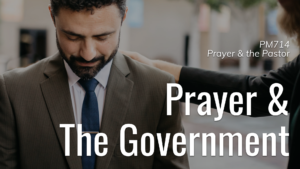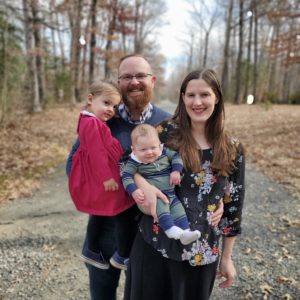On Wednesday, January 18th, The Master’s Seminary did something it had never done before. It posted a lecture on YouTube from a course designed exclusively for students receiving a TMS education away from the school’s Southern California campus.
 Dr. Nathan Busenitz, Executive Vice President and Dean of Faculty, gave the lecture “Prayer and the Government,” which is part of a pastoral ministries course titled Prayer and the Pastor. Anyone can watch this, in addition to four other lectures from the class, on the seminary’s YouTube page (the entire course is available only to seminary students enrolled in the class).
Dr. Nathan Busenitz, Executive Vice President and Dean of Faculty, gave the lecture “Prayer and the Government,” which is part of a pastoral ministries course titled Prayer and the Pastor. Anyone can watch this, in addition to four other lectures from the class, on the seminary’s YouTube page (the entire course is available only to seminary students enrolled in the class).
The class was produced by Nathan LeMaster, who oversees distance education at The Master’s Seminary. His goal is simple: to ensure The Master’s Seminary’s world-class education is as widely available as it can be without compromising the school’s commitment to education in a local church context. After all, one of The Master’s Seminary’s most compelling attributes is its location: on the campus of Grace Community Church. What students learn in the classroom they can immediately apply in their local church. Many professors are also pastors modeling faithful ministry. It’s not unlike a university hospital, an analogy John MacArthur has often used when talking about TMS. In that context, medical students can take what they learn in the classroom and immediately apply it in a hospital room. The concern with distance education is that it can remove the practical side of a TMS education in the local church and the discipleship that is part of everything TMS does. Dr. LeMaster is determined not to let that happen.
“The philosophy behind every distance education class is the same as the classes here on the campus of Grace Church,” LeMaster said. “It’s seminary education in the context of the local church. That drives our distance location. It drives the Mentor Model program. Of course, it drives what we do here in Los Angeles.”
The Master’s Seminary currently has seven distance locations: Washington D.C.; Dallas, Texas; Spokane, Washington; Anchorage, Alaska; Walnut Creek, California; Kingsburg, California; and Murrieta, California. Each is run on a local church campus and overseen by an alumnus of The Master’s Seminary. Both ensure distance location students are taught the same high view of Scripture and theological convictions as TMS, as well as the priority of the local church.
“The same philosophy of education that drives our distance locations also drives our Mentor Model program,” LeMaster said. “It’s designed for churches where a TMS alum is pastoring. We are looking for high-caliber guys that have many years of church ministry experience. As for the students, this program is tailor-made for a man who is called to ministry but can’t uproot himself or his family and move to L.A. Through the Mentor Model program, he can study under his pastor in their local church context. So again, we are not separating theological education from the local church. That has and always will be a priority at TMS.”
A decade ago, there was no distance education or online classes at The Master’s Seminary. Today, there are more than 100 students studying at a distance location. And there are more than 50 students enrolled through the Mentor Model program. All are receiving the same education, pursuing a Master of Divinity degree, just like their counterparts in Los Angeles. The Master’s Men who have already graduated from a distance location have become part of the fabric of TMS as they minister in churches across the globe. [Below is a brief interview with a Master’s Man named Brian Overholzer who graduated from a distance location and is currently in pastoral ministry.]
And as distance education at TMS continues to expand in the coming years, the plan is to make a percentage of the lectures that were part of these men’s education available on YouTube. Whether it’s a lecture on pastoral ministry, like Dr. Busenitz, or a class on theology, hermeneutics, or the Biblical languages, it’s a guarantee that they were first heard by a theological student preparing for ministry in a local church, under the tutelage of a Master’s Man.

Brian Overholtzer and his family serve at Providence Bible Church in Culpeper, Virginia.
1. Why did you decide to pursue pastoral training at TMS, and why was the campus in Alaska a good fit for you and your family?
I was attracted to The Master’s Seminary’s uncompromising stance on inerrancy and the priority of training expositors in God’s Word. The distance location in Alaska was great for my family. The church there welcomed us and came alongside us during seminary.
2. Where do you currently pastor and what are some encouraging aspects of your ministry?
I am currently the youth pastor at Providence Bible Church in Culpeper, Virginia. There are so many encouraging dynamics in this ministry. The church wants their youth to hear expository preaching and to be discipled by God’s Word. This short story is an example of their desire for God’s Word. During one of my first weeks with the students, I sprained my ankle playing volleyball and everyone was hoping I could still preach the Word (which I was able to). I just love the church’s desire for Scripture. I’ve also had the opportunity to disciple and train three high schoolers who have interest in being pastors, missionaries, and biblical counselors in the future.
3. How have you seen the training you received at TMS, both through the classes and the local church, prepared you for your current ministry?
The most helpful aspect of my training at TMS was the personal involvement of Pastor Jeff Crotts, my pastor and the professor who instructed me in preaching [at the Alaska distance location]. Besides this, I daily use the exegetical skills I was taught in my classes as I prepare for my teaching and preaching responsibilities at the church.
4. What are you excited about as you think about your church and the future of your ministry?
I love seeing the youth I serve grow in their knowledge and love for the Lord. It is clear that God the Holy Spirit is growing these young ones by the power of His Word. I’ve heard Pastor John MacArthur preach, “the Word did it all.” I can also testify of the same reality here, that the Word is doing it all.